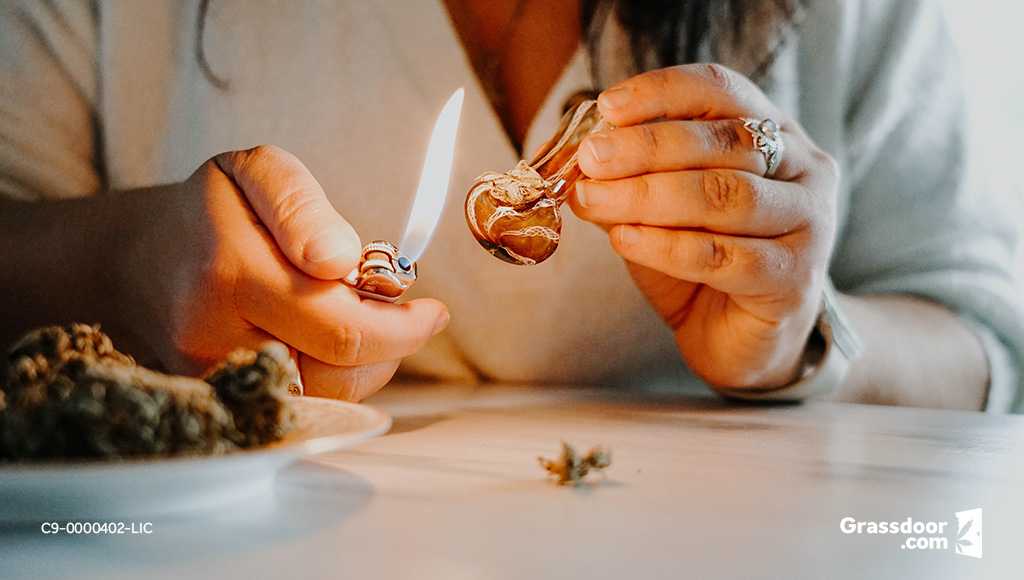At some point in time, you may have experienced a sense of calm after smoking a bud, making you curious if cannabis and mental health are related. It’s a topic at the forefront of public debate, with many Canna fans sharing personal stories about how cannabis has helped them manage anxiety, depression, and more.
But with all the buzz around cannabis, it can be tough to separate fact from fiction regarding its effects on mental health. It’s all the more reason to look closely at the research about the relationship between weed and depression-like symptoms.
While some studies suggest that cannabis may benefit mental health, others warn of potential risks. So, let’s dive in and explore what we know and don’t know and what we should keep in mind.
Cannabis and Mental Health: What Studies Say
Cannabis and Depression
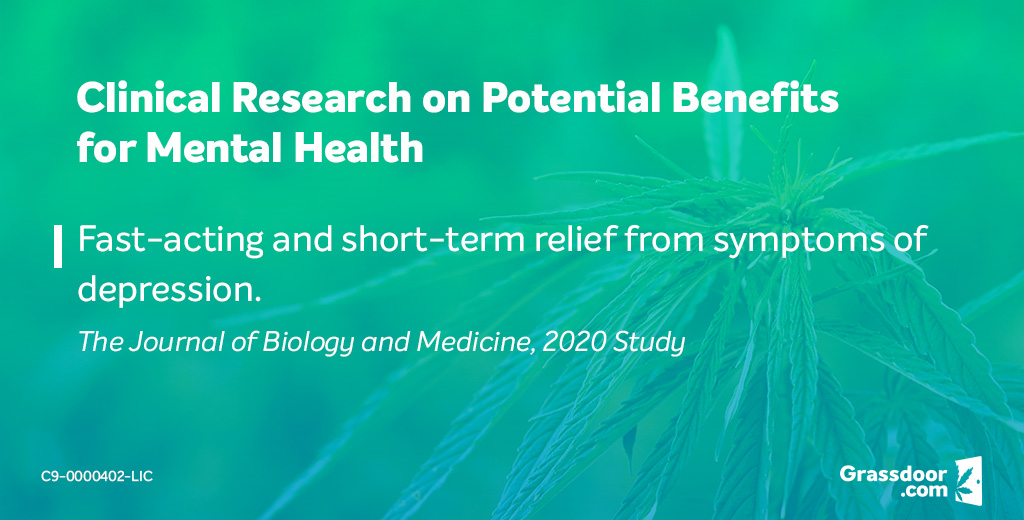
Millions of people worldwide suffer from depression. While some studies suggest that cannabis use may help alleviate symptoms of depression, others indicate the opposite. It’s crucial to explore the possibilities between weed and mental health by discussing a patient’s options with a certified healthcare professional.
However, a 2020 study published in The Journal of Biology and Medicine discovered that roughly 95% of participants reported experiencing fast-acting and short-term relief from symptoms of depression after consuming marijuana.
Cannabis and Anxiety
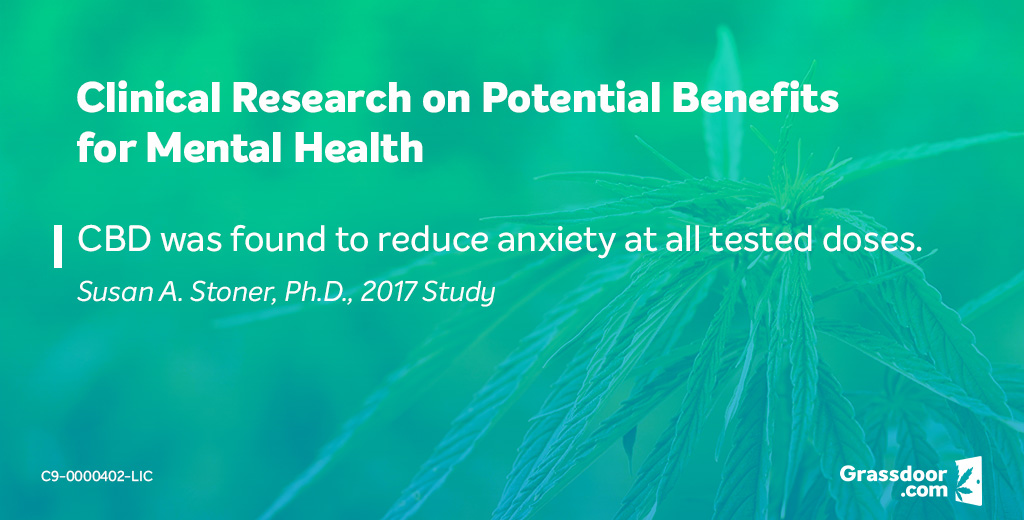
Hundreds of canna partakers consume cannabis to help manage anxiety symptoms, whereas some people think that weed only increases anxious thoughts. So, does weed cause anxiety? The evidence of the correlation between weed and mental health needs further investigation.
According to a 2017 study by Susan A. Stoner, Ph.D., Research Consultant on the Effects of Marijuana on Mental Health: Anxiety Disorders, lower doses of THC have been found to reduce anxiety, while higher doses have been linked to an increase in anxiety. In contrast, CBD was found to reduce anxiety at all tested doses. Studies in this area are promising and could be helpful for patients seeking alternative ways to handle anxiety.
Cannabis and PTSD
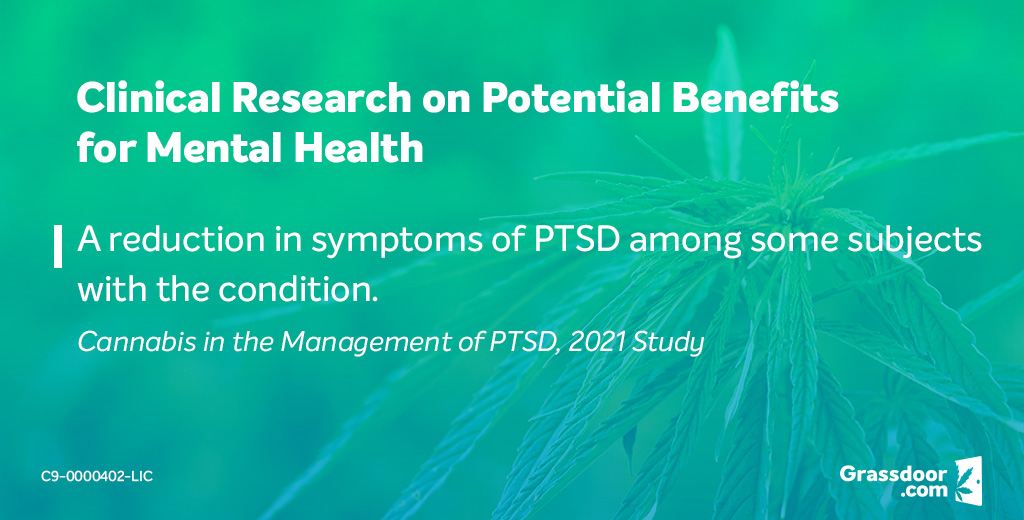
Post-traumatic stress disorder (PTSD) can occur in people who have experienced a traumatic event. Some studies suggest that cannabis may help alleviate symptoms of PTSD, such as anxiety and insomnia.
A 2021 study under the Cannabis in the Management of PTSD review found that cannabis use was associated with a reduction in symptoms of PTSD among some subjects with the condition. The study supports that more research is necessary on a larger scale to prove the effectiveness and monitor the outcomes of cannabis on PTSD patients.
Constituents of Cannabis for Mental Health: Do They Work?
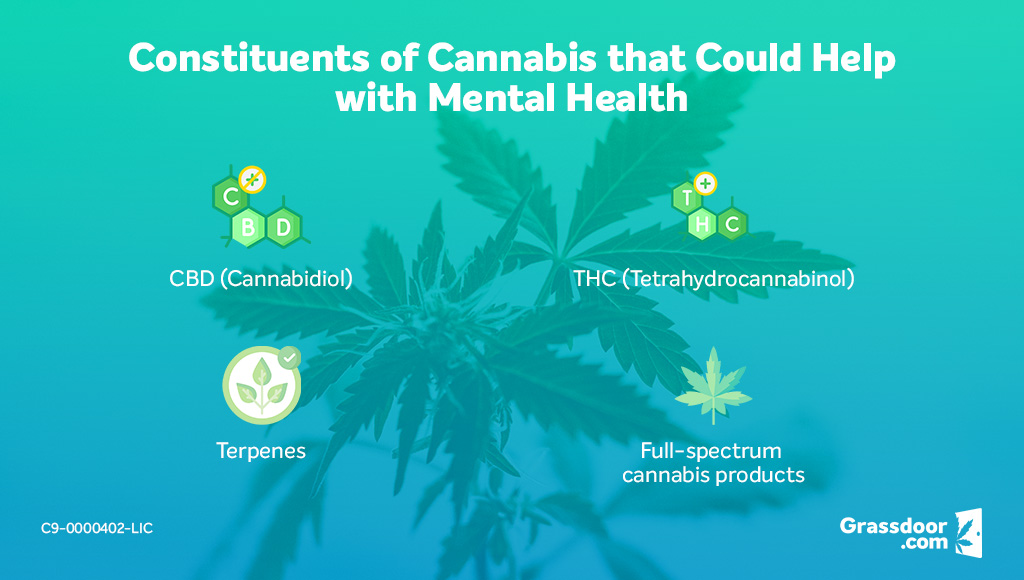
Several cannabinoids and cannabis essential oils could help treat mental health conditions such as depression, anxiety, and PTSD. It is important to note that factors such as endocannabinoid system activity, dosage levels, terpenoid composition, and phytocannabinoid balance may interfere with how patients react to cannabis for mental health disorders. Weed consumers must be cautious when considering weed and mental health treatment options.
We elaborate in the following section on how the different constituents of cannabis may help with mental health:
- Cannabidiol (CBD): CBD helps reduce anxiety and depression symptoms. CBD has also been studied for its potential to alleviate PTSD symptoms.
- Tetrahydrocannabinol (THC): THC tends to reduce symptoms of depression when consumed in low doses.
- Terpenes: Quality sleep is essential for overall mental health, and a lack of sleep has been linked to a higher risk of developing depression, anxiety, and other mental health conditions. Myrcene is known to improve sleep, which overall helps improve mental health.
- Full-spectrum cannabis products: Some researchers believe that full-spectrum cannabis products, which contain several cannabinoids and terpenes in addition to THC and CBD, may be more effective for treating certain mental health disorders than isolated cannabinoids.
Cannabis and Mental Health: Fact vs. Fiction
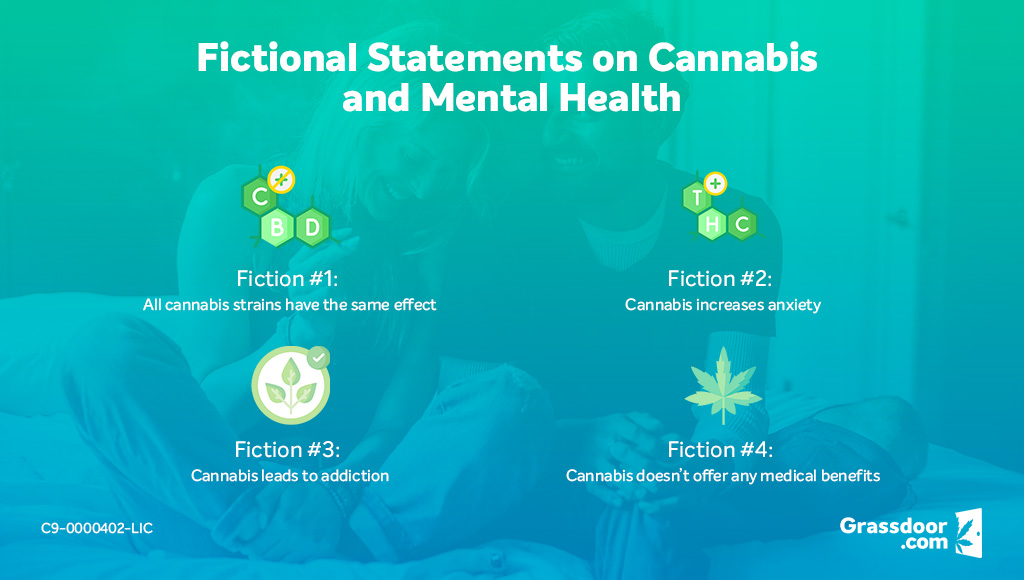
Now that we’ve understood so much about weed and mental health let’s uncover some facts about it.
Fiction #1: All cannabis strains have the same effect
Fact: Different strains of cannabis can have different effects on mental health. For example, some strains may have a higher concentration of THC, which can cause intense psychoactive effects, while others may have a higher concentration of CBD, which has a calming effect.
Fiction #2: Cannabis increases anxiety
Fact: While high doses of THC have been linked to increased anxiety, low amounts of THC and CBD could reduce anxiety in some people. Certain terpenes found in cannabis may also have calming effects and help reduce anxiety.
Fiction #3: Cannabis leads to addiction
Fact: While one can overindulge, most people who use cannabis do not become addicted. Factors that may increase the risk of developing a cannabis use disorder include overdosing on cannabis.
Fiction #4: Cannabis doesn’t offer any medical benefits
Fact: Cannabis offers several recreational and medical benefits for various health conditions, including chronic pain, epilepsy, and certain mental health disorders.
While more research is ongoing on the effects of cannabis on mental health, some studies have suggested that it may help reduce symptoms of depression, anxiety, and PTSD.
Is Cannabis Good for Your Mental Health?

As we wrap up, you must understand that the relationship between weed and mental health is complex and multifaceted. While some folks may find relief from symptoms of anxiety, depression, and PTSD by consuming cannabis, everyone’s experiences with cannabis use differ.
While some people may believe that using weed can lead to a decline in mental health, the reality is that there is a growing body of evidence that could prove otherwise. Rather than demonizing or idolizing cannabis consumption, we must approach this topic with a critical and informed perspective. The guidance of an expert medical expert is vital when exploring the depths of weed and mental health.
We’ve done our part in shedding light on the myths and misconceptions surrounding cannabis use and mental health, now, you must do yours by spreading the word. As always, consult a health practitioner first if you’re looking for ways to handle mental health issues with cannabis. To know more about cannabis and the benefits associated with responsible weed consumption, head over to Grassdoor.

